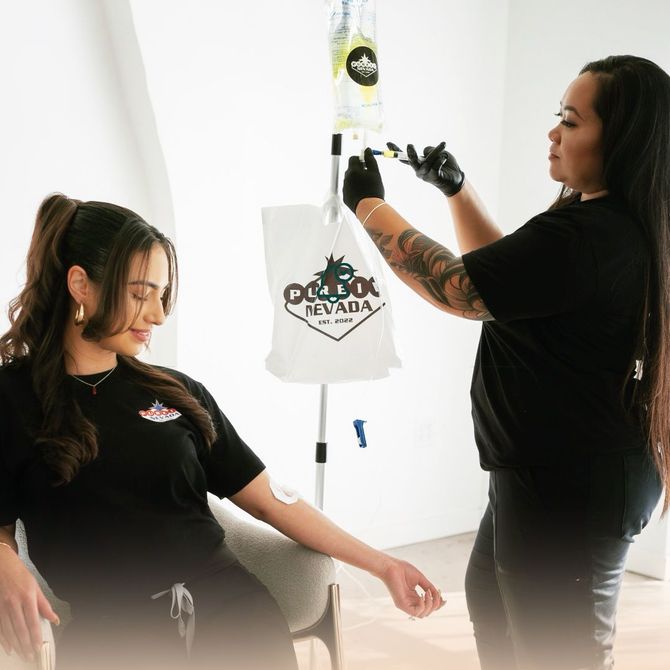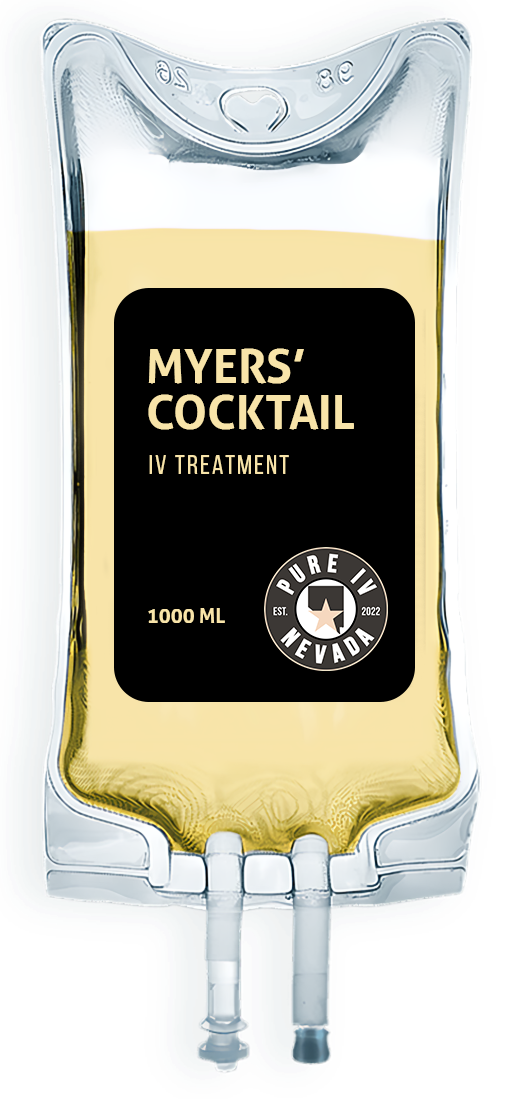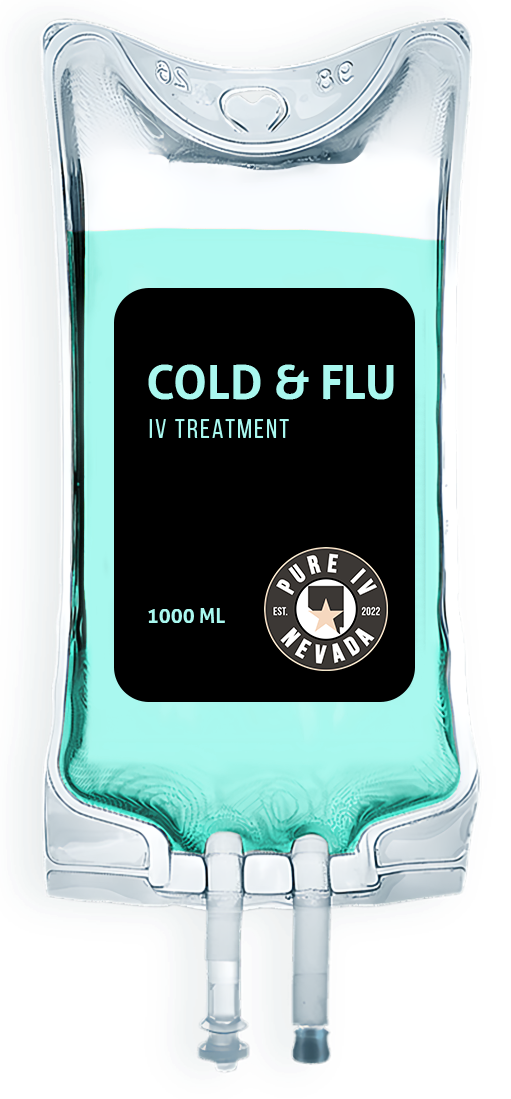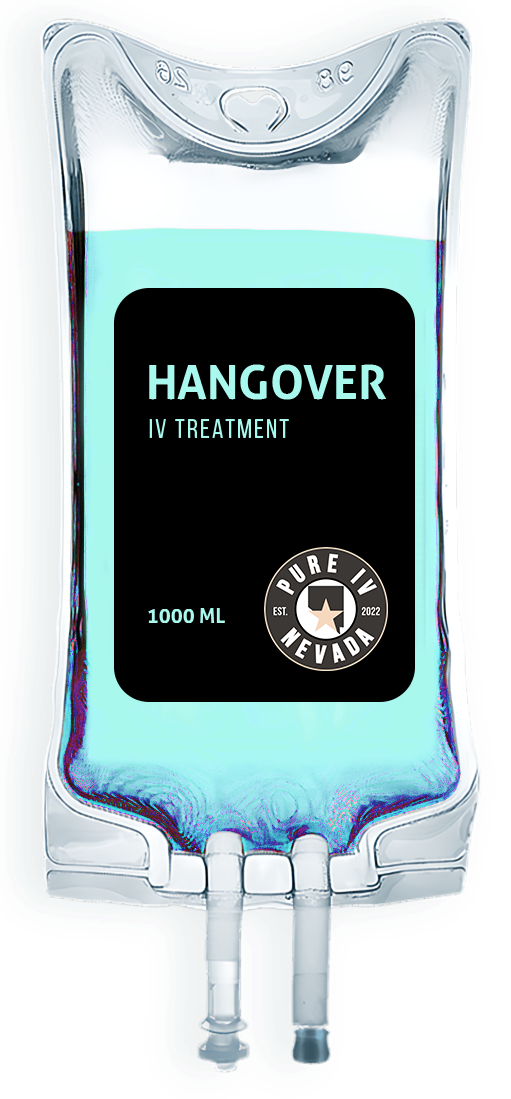Las Vegas Mobile IV Therapy - Professional Hydration Delivered to Your Door
Fast relief from hangovers, dehydration, cold & flu, and fatigue. Licensed nurses bring premium IV treatments to your home, hotel, or office anywhere in Las Vegas, Henderson, Summerlin, and surrounding Nevada areas.
Licensed Registered Nurses
Same-Day Appointments
Strip Hotels Welcome
100% Mobile Service

Las Vegas Mobile IV Therapy
Mobile Service
Pure IV Nevada is Las Vegas’s premier mobile IV therapy provider, delivering professional vitamin infusions and hydration treatments directly to your location throughout Clark County. Our licensed registered nurses and nurse practitioners bring hospital-grade IV therapy to your home, hotel room on the Las Vegas Strip, office, or event venue.
Serving Nevada Since 2022 - We’ve helped thousands of Las Vegas residents and visitors recover from hangovers, dehydration, jet lag, altitude sickness, migraines, and fatigue with fast, effective mobile IV treatments.
Why Choose
Pure IV Nevada?
Licensed Medical Professionals
Every IV treatment is administered by Nevada-licensed registered nurses under the supervision of experienced nurse practitioners. Your safety is our priority.
Las Vegas Strip Specialists
We serve all major hotels on the Las Vegas Strip with fast response times.
Same-Day Service
Call or book online for same-day mobile IV therapy anywhere in the Las Vegas Valley. Most appointments available within 2 hours.
Comprehensive Treatment Menu
From Myers Cocktail to High Rollers IV, we offer specialized formulations for hangover relief, immune support, athletic recovery, and wellness optimization.
IV Therapy Services & Pricing
Most Popular Treatments
Add-On Enhancements
($30 Add-On)
- Glutathione (master antioxidant)
- Extra B12 boost
- Vitamin C mega-dose
- Zinc immune support
- Anti-nausea medication
- Anti-inflammatory medication
- Magnesium
- And Much More! Just ask your nurse on scene

Service Areas - Nevada Locations
Primary Service Areas
Las Vegas, NV
Mobile IV therapy throughout downtown Las Vegas, the Arts District, and residential neighborhoods. Fast service to all zip codes: 89101, 89102, 89104, 89106, 89107, 89108, 89109 (Strip), 89110, 89128, 89129, 89134, 89135, 89138, 89143, 89144, 89145, 89146, 89147, 89148, 89149, 89166, 89169, 89178, 89179, 89183.
Henderson, NV
Serving all Henderson neighborhoods including Green Valley, Anthem, Seven Hills, MacDonald Ranch, and Lake Las Vegas. Zip codes: 89002, 89011, 89012, 89014, 89015, 89044, 89052, 89074.
Summerlin, NV
Mobile IV service throughout Summerlin South, Summerlin Centre, The Ridges, Red Rock Country Club, and all master-planned communities. Zip codes: 89128, 89134, 89135, 89138, 89144, 89145.
North Las Vegas, NV
Complete coverage of North Las Vegas, Aliante, Eldorado, and surrounding areas. Zip codes: 89030, 89031, 89032, 89081, 89084, 89085, 89086.
Paradise, NV
Serving Paradise, University District, and areas near UNLV and McCarran International Airport. Zip codes: 89109, 89119, 89120, 89121, 89123.
Enterprise, NV
Mobile IV therapy for Enterprise, Rhodes Ranch, and southwest Las Vegas Valley. Zip codes: 89113, 89139, 89141, 89148, 89183.
Spring Valley, NV
Serving Spring Valley, Desert Shores, Peccole Ranch, and west Las Vegas. Zip codes: 89102, 89117, 89146, 89147.
Laughlin, NV
Mobile IV service to Laughlin hotels, casinos, and residential areas along the Colorado River. Zip code: 89029.
How Mobile IV Therapy Works in Las Vegas
Step 1
Book Your Appointment
Schedule online at pureivnevada.com or call/text (702) 830-4981. Choose your IV treatment and preferred time. Same-day appointments available.
Step 2
Complete Medical Intake
Fill out our secure online medical history form. Our nurse practitioner reviews your information to ensure treatment safety.
Step 3
We Come to You
A licensed registered nurse arrives at your Las Vegas location with all equipment and supplies. Setup takes just minutes.
Step 4
Receive Your Treatment
Relax in comfort while receiving your IV therapy. Most treatments take 30-45 minutes. Feel the benefits immediately.
Conditions We Treat in Nevada
✔ Hangover recovery (alcohol dehydration)
✔ Dehydration from heat exposure
✔ Altitude sickness and elevation adjustment
✔ Migraine and headache relief
✔ Nausea and vomiting
✔ Food poisoning recovery
✔ Cold and flu symptoms
✔ Athletic performance and recovery
✔ Jet lag and travel fatigue
✔ Chronic fatigue syndrome
✔ Allergies and sinus issues
✔ Immune system support
✔ Anti-aging and wellness optimization
Las Vegas Strip Hotel Service
We provide mobile IV therapy to all major Las Vegas Strip hotels and casinos including:
- Bellagio
- Caesars Palace
- MGM Grand
- Wynn
- Encore
- Venetian
- Palazzo
- Aria
- Cosmopolitan
- Park MGM
- Mandalay Bay
- Luxor
- Excalibur
- New York–New York
- Paris
- Planet Hollywood
- Flamingo
- Linq
- Harrah’s
- Mirage
- Treasure Island
- Sahara
- Resorts World
- Circa
- Golden Nugget

Why Las Vegas Residents Choose Pure IV Nevada
Faster Than Urgent Care Skip the 2-3 hour wait at urgent care or ER. Get IV therapy at home in under an hour.
More Affordable Than Hospitals Hospital IV treatments can cost $500-$2,000. Our mobile service delivers the same quality care at a fraction of the cost.
Nevada Licensed & Insured Fully licensed to operate in Nevada with comprehensive liability insurance. All nurses are Nevada Board of Nursing licensed.
Medical Director Oversight Every treatment protocol is approved and overseen by our experienced nurse practitioners and medical directors.
Sterile, Medical-Grade Supplies We use only FDA-approved IV fluids, vitamins, and medications. All equipment is sterile and single-use.
Patient Reviews & Testimonials
Check out what our clients say about us!
At Pure IV Nevada, licensed professionals, including Registered Nurses, ensure safe, high-quality in-home IV therapy.
FAQ's
Frequently Asked Questions
Is mobile IV therapy safe?
Yes. All treatments are administered by Nevada-licensed registered nurses using sterile, medical-grade equipment and FDA-approved medications.
How long does treatment take?
Most IV therapy sessions take 30-45 minutes from start to finish.
Do you serve Las Vegas Strip hotels?
Yes! We serve all Strip hotels with a $30 additional service fee.
What areas do you cover?
We serve all of Las Vegas, Henderson, Summerlin, North Las Vegas, Paradise, Enterprise, Spring Valley, and Laughlin.
Can I book same-day service?
Yes. Most same-day appointments are available within 2 hours of booking.
What payment methods do you accept?
We accept all major credit cards, HSA/FSA cards, and cash.
Do you take insurance?
We do not bill insurance directly, but we provide receipts for HSA/FSA reimbursement.
Blogs
Latest News & Articles

Book Your Mobile IV Therapy in Las Vegas Today
Call or Text: (702) 830-4981
Book Online: pureivnevada.com/book-online
Hours: 8 AM - 8 PM Daily (Mobile Service Only)
Service Area: Las Vegas | Henderson | Summerlin | North Las Vegas | Paradise | Enterprise | Spring Valley | Laughlin | All of Clark County, Nevada







